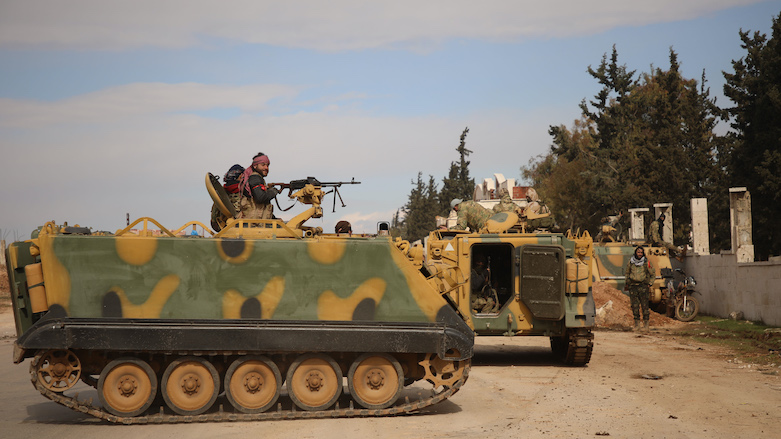Erdogan warns Damascus of ‘heavy price,’ as tensions escalate

WASHINGTON DC (Kurdistan 24) – Turkish President Recep Tayyip Erdogan warned the Syrian regime on Tuesday that it would pay a “heavy price” for attacking Turkish forces.
“We gave the necessary responses to the Syrian side at the highest level,” Erdogan said. “Especially in Idlib, they got what they deserved. But this is not enough, it will continue,” as he said that he would announce new measures for Idlib on Wednesday.
Similarly, Turkey’s Defense Minister Hulusi Akar, speaking to the Associated Press, also on Tuesday, affirmed that Turkey would not leave its military posts in Syria, which were established as a result of a 2018 agreement between Turkey and Russia which affirmed that the province of Idlib was a “de-escalation zone” in which fighting was banned.
The agreement provided for Turkey to establish observation posts in the province to enforce the ceasefire, and Turkey has, again, asserted that it will maintain those positions. As Akar stated, “In the event of any action against” Turkish forces in those posts, “they have been given instructions to retaliate even more powerfully,” adding, “in the event anything happens, there will be retaliation. We expect the regime not to take any action under any circumstances.”
The latest developments follow two days of talks with a visiting Russian delegation. However, the delegation left Ankara on Monday without reaching any agreement.
Meanwhile, Amb. James Jeffrey, US Special Representative for Syria Engagement and the Special Envoy for the Global Coalition to Defeat ISIS, arrived in Ankara late on Tuesday. On Wednesday, he holds talks with Turkish officials to discuss the situation in Syria.
“Today, our NATO ally Turkey is facing a threat from Assad’s government and Russia,” Jeffrey said on Tuesday, shortly after his arrival. “We are here to assess the situation with the Turkish government and offer support if possible.”
Turkish and Syrian forces are increasingly clashing in Idlib province, as Damascus pushes northward with an offensive to recover the country’s last rebel-held area in a civil war that stretches back nine years, to the 2011 “Arab Spring.”
Five Turkish soldiers died on Monday when Syria shelled the Taftanaz airbase in Idlib’s northwest. Turkey had just erected a military facility there and, shortly thereafter, Syria attacked. Ankara immediately responded with artillery fire that it claimed had “neutralized” 101 Syrian troops.
Monday’s exchange was the second such incident in as many weeks. On Feb. 3, eight Turkish citizens in Syria, both soldiers and contractors, were killed in a Syrian attack, and Ankara responded with a counter-assault that, according to Turkish officials, killed 76 Syrian troops.
Some three million civilians are now in Idlib, many having moved there, from other areas of Syria, as the regime re-established control. They are now trapped between the advancing Syrian forces and the Turkish border, which Ankara has closed.
Turkey hosts some 3.6 million Syrian refugees and says it cannot accept any more. A new influx could also threaten European countries with another refugee crisis, with possibly significant implications for their domestic politics. In Germany, for example, the crises in the Middle East have led to the rise of the neo-Nazi, anti-immigration party, AfD (Alternative für Deutschland).
Russia has remained a steadfast ally of the Syrian regime, and the US has charged that Moscow’s support for the offensive is key. However, neither the US nor Europe appears to have developed a viable plan for pressuring Moscow or otherwise stopping the offensive.
Read More: US renews call for Russian restraint in Syria, as Idlib offensive continues
The refugees’ situation is dire, and on Tuesday, the UN repeated its earlier warnings of a humanitarian crisis.
“It’s the fastest growing displacement we have ever seen in the country,” Jens Laerke, of the UN Office for the Coordination of Humanitarian Affairs (OCHA), stated, as he explained that nearly 700,000 people, mostly women and children, had fled since December.
“Even finding a place in an unfinished building has become nearly impossible,” another UN spokesperson told journalists in Geneva.
Editing by Karzan Sulaivany
